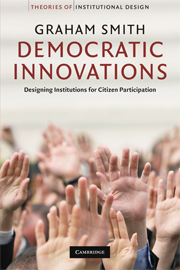Book contents
- Frontmatter
- Contents
- Acknowledgments
- Introduction
- 1 Studying democratic innovations: an analytical framework
- 2 Popular assemblies: from New England town meetings to participatory budgeting
- 3 Mini-publics: assemblies by random selection
- 4 Direct legislation: direct democracy through the ballot box
- 5 E-democracy: the promise of information and communication technology
- 6 Realising the goods of democratic institutions
- Conclusion
- References
- Index
1 - Studying democratic innovations: an analytical framework
Published online by Cambridge University Press: 19 January 2010
- Frontmatter
- Contents
- Acknowledgments
- Introduction
- 1 Studying democratic innovations: an analytical framework
- 2 Popular assemblies: from New England town meetings to participatory budgeting
- 3 Mini-publics: assemblies by random selection
- 4 Direct legislation: direct democracy through the ballot box
- 5 E-democracy: the promise of information and communication technology
- 6 Realising the goods of democratic institutions
- Conclusion
- References
- Index
Summary
Until fairly recently, relatively little attention has been paid to the systematic evaluation of democratic innovations, and there is thus a dearth of systematic comparisons. Why is this? Democratic theorists have proved to be strong on arguing the case for citizen participation, but, with a few notable exceptions, discussions have remained at a high level of abstraction – there has been a failure to systematically engage in the ‘messy’ and detailed task of institutional design. Perhaps our expectations of democratic theorists are too high and we need to recognise the division of labour within the discipline of politics: there are other scholars who (should) pick up this task of studying innovations. There is, for example, a formidable community of political scientists – such as Russell Dalton, whose work was discussed briefly in the Introduction – who study citizens' democratic attitudes and behaviour. However, they tend to focus on elections and other more familiar modes of political activity: democratic innovations are relatively marginal forms of democratic practice and typically fall below political scientists' radar. As with democratic theorists, their studies often point towards the need to consider alternative modes of political engagement, but generally take us no further.
There would thus appear to be a gap in the discipline – a lack of concerted attention to theoretically informed, comparative studies of democratic innovations. This has exercised a number of democratic theorists.
- Type
- Chapter
- Information
- Democratic InnovationsDesigning Institutions for Citizen Participation, pp. 8 - 29Publisher: Cambridge University PressPrint publication year: 2009
- 2
- Cited by



